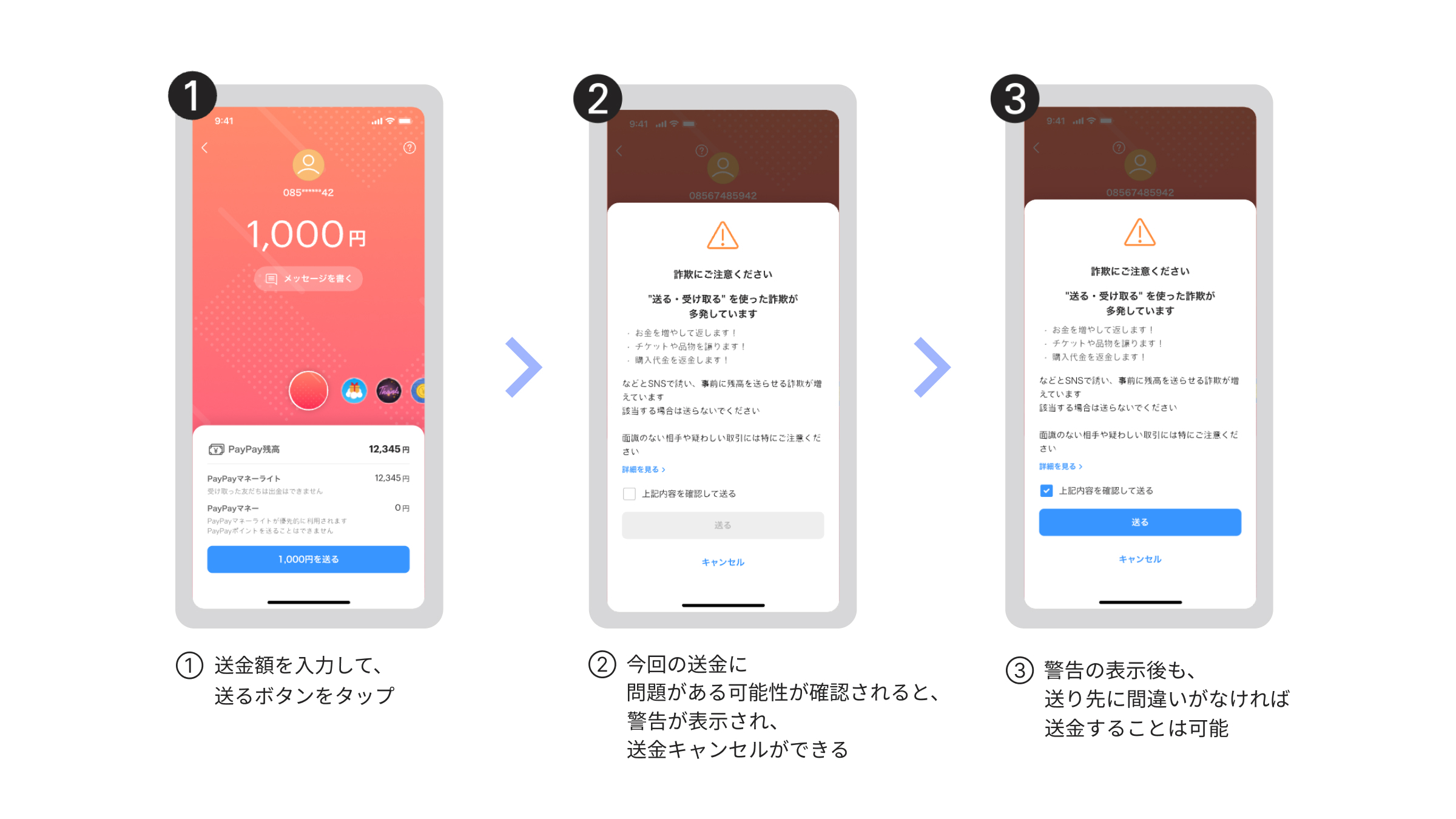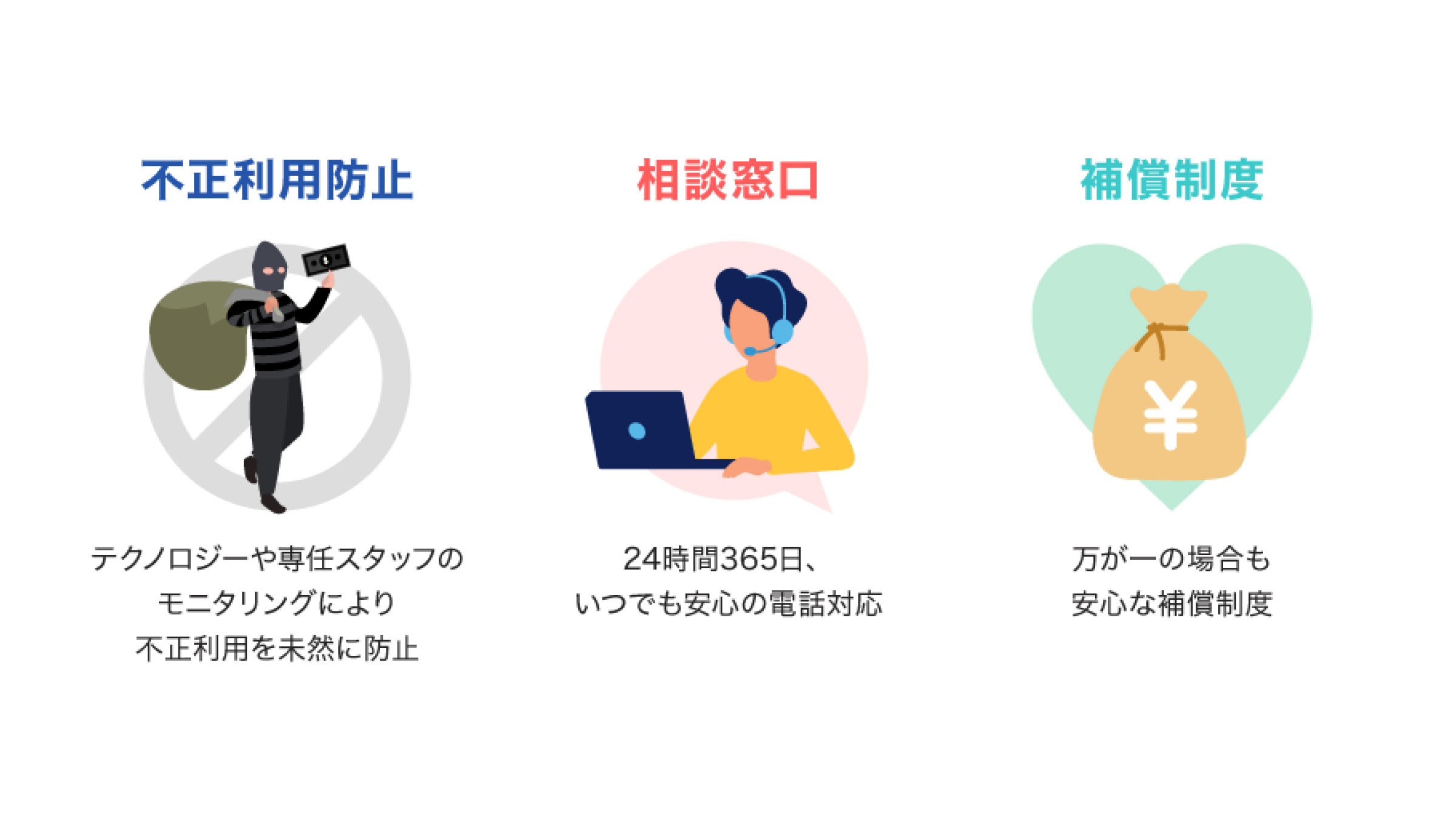On November 14, 2023, PayPay Corporation (hereinafter “PayPay”) introduced a feature that displays warning messages based on the transaction history of the recipient when users remit or transfer money*1 using the Send・Receive feature*2 through the cashless payment service “PayPay.” With this, users can recognize the possibility of fraud and cancel the transaction, thus helping to prevent potential harm.
*1 When sending PayPay Money, it is a “remittance,” and when sending PayPay Money Lite,
it is a “transfer.” Please refer to the PayPay Balance Terms of Use
for details.
*2 For more information about the Send・Receive feature, please click here.

This year, there has been a surge in phishing and unauthorized remittance frauds exploiting internet banking. Due to this, the Financial Services Agency, National Police Agency, and National Consumer Affairs Center of Japan are issuing warnings.*3 With “PayPay,” which accounts for approximately 92%*4 of the P2P payments*5 of all mobile payment services, various preventive and security measures have been implemented, such as displaying warning messages and raising awareness during transactions, especially when dealing with users with whom there has been no prior interaction.
Now, for an even safer use of the Send・Receive feature, a warning message regarding fraud will be displayed when sending money to users who meet certain criteria based on their transaction history.
The warning message includes an alert about the increase in scams where people are lured on social media with offers like “I will increase your PayPay Balance if you let me take care of it” or “I’ll give you tickets or items (such as gaming consoles) ,” and are asked to send money in advance. In addition to this, the message also includes a link to a help page*6 that summarizes the methods employed in unauthorized use and fraud, thereby making users aware of the possibility of fraud and encouraging them to reconsider sending their money. Users can cancel the transaction by tapping the “Cancel” button, but if they choose to proceed, they must confirm by ticking a box that says “I have read the above and confirm the transaction.”
*3. – Financial Services Agency, “The number of unauthorized transfers from internet banking accounts, suspected to be due to phishing, is rapidly increasing” (updated August 8, 2023) .
– National Police Agency, Cyber Police Agency, ” Anti-Phishing Measures.“
– National Consumer Affairs Center of Japan, “[New type of scam] Beware of ‘We will refund your money with XX Pay’ messages!” (published September 27, 2023) , and
“Hold on before you click the link! Number of Phishing scam messages via SMS and email remain high!” (published November 8, 2023)
*4. Including both PayPay Money remittances and PayPay Money Lite transfers.
*5. The share of “PayPay” was calculated by PayPay based on the publication by PAYMENTS JAPAN, “Stats – Code Payment,” Stats – Code Payment, published on March 3, 2023 (updated July 7, 2023)
*6 Please check here (PayPay help page) for more information on measures to prevent unauthorized use and fraud.
Until now, PayPay has taken various security measures to ensure that users can use PayPay with peace of mind.*7 Among others, these measures include enhanced SMS authentication and login management features, fraud prevention measures that involve constant monitoring using cutting-edge technology as well as dedicated staff, 24/7 all-year “PayPay” telephone hotline to answer any questions, and full compensation (in principle) by PayPay in case users become victims of unauthorized use due to their accounts, bank accounts, or credit card information getting stolen and misused by third parties.
PayPay plans to continue strengthening measures to prevent potential damage from unauthorized use.
*7 For more information on PayPay’s safety initiatives, please click here.

PayPay Corporation is registered as follows:
・Prepaid Payment Instruments (third party type) Issuer (Registration number: Director-General of the Kanto Finance Bureau, No. 00710 / Registration date: October 5, 2018)
・Business Operator that Concludes Contracts on the Handling of Credit Card Numbers, etc. (Registration number: Kanto (Ku) No. 106 / Registration date: July 1, 2019)
・Telecommunications Carrier (Filing number: A-02-17943 / Date filed: July 2, 2019)
・Fund Transfer Operator (Registration number: Director-General of the Kanto Finance Bureau, No. 00068 / Registration date: September 25, 2019)
・Notified Entity Entrusted with Intermediation (Filing number: C1907980 / Date filed: December 18, 2019)
・Bank Agency Services (License: Director-General of the Kanto Finance Bureau (Gindai) No. 396 / Registration date: November 26, 2020)
・Financial Instruments Intermediary Services (Registration number: Kanto Finance Bureau Director (Kinchu) No.942 / Registration date: June 25, 2021)
・Electronic Payment Agency Services (License: Director-General of the Kanto Finance Bureau (Dendai) No.109 / Registration date: February 14, 2023)
・Japan Payment Service Association ( https://www.s-kessai.jp/ , Date of admission: September 12, 2018)
・Japan Consumer Credit Association ( https://www.j-credit.or.jp/ , Date of admission: July 1, 2019)
* “PayPay” offers four types of electronic money and other services: PayPay Money, PayPay Money Lite, PayPay Points, and PayPay Gift Certificates.
PayPay Money can be used to pay for partner services and merchants if it is within the amount deposited into the
PayPay account opened after completing an identity verification process. It can also be used for sending and
receiving money between PayPay users free of charge. PayPay Money can also be cashed out to a designated bank
account (no withdrawal fee if using PayPay Bank). The legal nature of this is an electromagnetic record which can be
used to pay for goods and services, can be remitted or cashed out, and is issued by PayPay who is a Fund Transfer
Operator registered under Article 37 of the Payment Services Act. Based on the provisions of Article 43 of the
Payment Services Act, PayPay protects the debt it owes to its users by depositing assets equivalent to or higher
than the debt amount. PayPay Money Lite is an electronic money issued by PayPay, which can be purchased and used to
pay for services and merchants. PayPay users can transfer and receive PayPay Money Lite free of charge. The legal
nature of this is a prepaid payment instrument issued by PayPay (Article 3, Paragraph 1 of the Payment Services Act).
Based on the provisions of Article 14 of the Payment Services Act, PayPay preserves the relevant assets for the
purpose of protecting the owners of the prepaid payment instrument by providing a security deposit for issuance to
the Legal Affairs Bureau in an amount that is half or more of the unused balance of prepaid instrument methods as of
March 31 and September 30. In addition, PayPay Points, which are granted through campaigns and promotions when using
PayPay, can be used for partner services and in transactions at merchants in addition to PayPay Money and PayPay
Money Lite. However, it cannot be transferred to other users or cashed out. PayPay Gift Voucher is a type of
electronic money issued by PayPay, which can be used to make payments for affiliated services and merchants
designated by the PayPay Gift Voucher. However, it cannot be transferred to other users or cashed out. PayPay Gift
Vouchers have an expiration date, after which they will no longer be valid. The deadline for Gift Vouchers can be
confirmed in the details or specifications of the measure or promotion campaigns for which they are issued.
PayPay also strives to create a safe and secure environment for users. If an unexpected payment is made by a third
party using a PayPay account, or if a request to settle a payment suddenly arrives from PayPay to a user that does
not have a PayPay account, there is a scheme that ensures compensation for the damages suffered (the difference will
be provided as compensation if compensation is also provided by a third party) , given that the prescribed conditions
are met. Please see Applying for compensation for details.
*Company names, trade names, and products/services in this press release are registered trademarks or trademarks of their respective companies.





